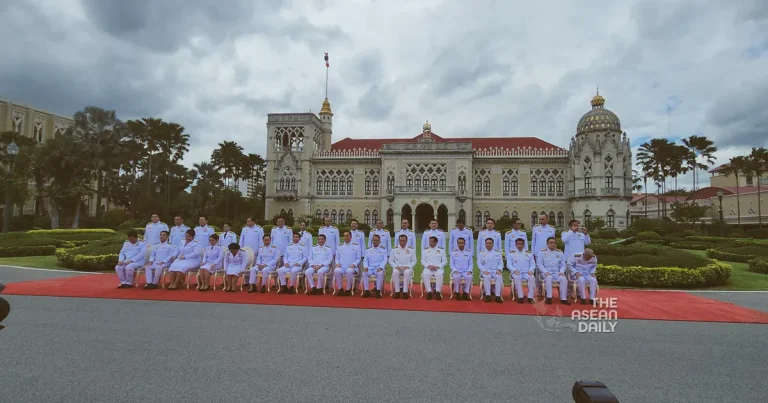11-9-2023 (BANGKOK) The new cabinet in Thailand has begun its work, with Prime Minister Srettha Thavisin leading his team in their swearing-in ceremony at Government House. Several new ministers wasted no time in occupying their new offices even before the policy announcement, scheduled for today.
However, the 43-page draft policy statement released on Friday has faced criticism from the public for its apparent lack of policies proposed by coalition parties during their election campaigns.
The private sector is looking forward to greater coordination between key economic ministries, particularly as many have been allocated to the Pheu Thai Party. This integration is expected to enhance policy continuity, a feature often observed in previous governments.
Nonarit Bisonyabut, a research fellow at the Thailand Development Research Institute, stressed the importance of economic management based on measurable conditions rather than political expectations. While the government may want to fulfill all campaign promises, economic management involves selecting appropriate scale and timing for stimulus measures.
The current economic climate necessitates stimulus measures, with growth projected at 2.8%, below earlier estimates of 3.7-3.8%. To boost GDP by one percentage point through stimulus, a budget of 200 billion baht is required. However, implementing the 10,000-baht digital handout policy for citizens aged 16 and older would cost approximately 560 billion baht, which some analysts consider excessive and inefficient.
The focus should be on targeted stimulus measures to aid vulnerable groups rather than excessive government spending, which could burden future generations and risk fiscal stability.
Payong Srivanich, chairman of the Thai Bankers’ Association, called for efforts to reduce small and medium-sized enterprise (SME) and household debts. Collaboration between the Bank of Thailand and financial institutions is crucial, particularly focusing on low-income earners, farmers, and SMEs.
Sanan Angubolkul, chairman of the Thai Chamber of Commerce, expressed confidence in the new commerce minister, Phumtham Wechayachai. The chamber intends to propose using the Joint Public and Private Sector Consultative Committee on Commerce as a platform to address trade obstacles and expand international trade markets.
Given the slowdown in trade partner economies like the US, EU, and China, the chamber suggested accelerating free trade agreement negotiations with these regions and controlling raw material costs to bolster the business sector’s competitiveness.
Chairman of the Thai National Shippers’ Council (TNSC), Chaichan Chareonsuk, urged the new commerce minister to address production costs, including electricity bills and fuel prices, and enhance financial liquidity for SMEs.
Environmental integration is also essential due to the imminent threat of severe El Niño conditions, which could impact agricultural products and food exports.
Marisa Sukosol Nunbhakdi, president of the Thai Hotels Association, emphasized the need for policies that focus on developing the supply side of tourism to increase its value in Thailand. Instead of pursuing high tourist numbers, the emphasis should be on creating new products that cherish traditions and add more value to the sector.
The Thai Hotels Association is keen to understand the structure and long-term plans of the proposed Thailand Creative Content Agency (Thacca) if it becomes part of government policy. Thacca could offer one-stop services for the private sector and provide funds for development, benefiting sectors such as Mice (meetings, incentives, conventions, and exhibitions), medical and wellness, and community-based tourism.
The Federation of Thai Industries (FTI) urged the Industry Ministry to curb the influx of cheap Chinese goods, which is affecting local businesses, especially SMEs. Failure to address this issue could significantly impact the entire industry.
FTI chairman Kriengkrai Thiennukul urged the ministry to work with the Thai Industrial Standards Institute to regulate the import of Chinese goods. Continued Chinese imports could lead to reduced capacity utilization among local companies, causing a significant trade deficit with China.
The FTI supports the new Energy Minister Peeraphan Salirathaviphak’s plans to reduce energy prices, including diesel, to ease living costs and operating expenses for businesses.
However, Littee Kitpipit, CEO of compressed natural gas seller and clean power operator Scan Inter (SCN), cautioned against the diesel price subsidy programme, which may worsen dust pollution in Thailand. Diesel-powered vehicles are a significant source of PM2.5 ultra-fine dust, and controlling the influx of Chinese goods is crucial to tackle this issue effectively.




